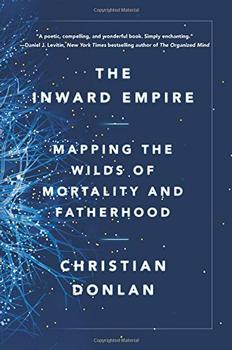Summary | Excerpt | Reviews | Beyond the book | Read-Alikes | Genres & Themes | Author Bio

One Man’s Fight Against One of the World’s Deadliest Diseases
by Dr. Ross Donaldson MD, MPHEditor's Note: This review contains graphic content that may be disturbing to some readers.
The Lassa Ward is a potent mix of travel memoir, coming-of-age narrative and medical mystery. Donaldson's experiences treating a frighteningly infectious and often deadly hemorrhagic fever, the strength of his West African patients, and his own grave illness bring him to a contemplation of mortality, poverty, civil war, and medicine as it is practiced in the first and third worlds.
A third-year medical student, Donaldson comes to Sierra Leone to complete a paper on Lassa fever. But his interest in the sickness is more than scientific:
From the moment I had first heard about the dreaded Lassa virus... I had been drawn to the illness. The disease is one of four famed [viral hemorrhagic fevers]... that share a terrifying tendency to spread from person to person, as well as a gruesome clinical picture of massive bleeding frequently leading to death.
Donaldson admits that in the dry, competitive, and often cynical environment of medical school, "... Lassa became a symbol... of foreign adventure and unquestionable need... I had studied for years to swear an oath to care for the sick... confronting Lassa seemed to be the ultimate test of such moral fortitude." Donaldson hopes that the extreme and edgy challenge of working with a hazardous pathogen in primitive conditions will cure his burnout and reanimate the practice of medicine. But he immediately discovers that the cruelty and chaos of life in Sierra Leone is more numbing than enlivening:
As we turned onto a small side street, my driver suddenly slammed on the brakes and our car skidded to an abrupt stop, only inches away from a cowering African woman. She lay collapsed on the ground in front of us, with ineffectual hands guarding her head. It took me a few moments to register that a large man, standing above her, was screaming incoherently while beating her with his hands and feet.
Neither the driver nor onlookers intervene to help the woman: the beating only ceases when the driver berates the couple for blocking the road. Violence and its effects are visible everywhere in Sierra Leone. Mortar fire has ravaged the town of Kenema, and even when Donaldson visits its hospital, former RUF fighters, notorious for their rapes, abductions and amputations, congregate casually in the parking lot.
Most of Donaldson's time is spent in Kenema's Lassa ward where he works under the supervision of its experienced and compassionate director, Sierra Leonean physician, Dr. Aniru Conteh. Spread through the urine and droppings of rats (and through the eating of carrier-rats by a hungry populace), the Lassa virus incubates from 5 to 21 days before afflicting its victims with fever, aches and sore throats - symptoms indistinguishable from malaria or yellow fever. It is only after the virus progresses and become life-threatening that it can be identified as the Lassa virus and treated with the antiviral drug, Ribavarin. If treatment begins too late, victims hemorrhage and die:
Blood-soaked sheets covered the unmoving body as wails pierced the thin walls of the Lassa ward from outside. The boy had died early that morning, just before I arrived. Like a punctured water balloon, his body had spouted fluid out of every orifice and former IV site. The child had drowned as the liquid quickly filled his lungs.
Our guard didn't allow the boy's family to enter. Their precious youngster had transformed into a mass of infectious waste, potentially spreading disease to anyone who touched him.
The Lassa virus is ferocious, but Donaldson, Dr. Conteh and the nurses of the Lassa ward have few tools with which to diagnose or treat their patients, and even less with which to protect themselves from the virus. Absent in Kenema are the "space suits" and cleansing ventilation systems used by doctors working with Class A pathogens in the West. Instead, Donaldson and his colleagues wear only boots, gowns, masks, protective eyewear, caps, and rubber gloves, and have only bleach to clean infectious, blood-spattered surfaces and equipment. Supplies are insufficient and tools are basic or unreliable. When the rickety centrifuge used to process infected blood breaks down, they spin the vials with ropes.
When Dr. Conteh must leave the ward for a time, Donaldson is on his own and overwhelmed, at first, with his responsibilities. His inexperience, self-doubt, and the lack of diagnostic equipment transform each symptom into an urgent medical mystery, and every medical decision into a life-or-death gamble. This is the most engrossing part of his memoir, and Donaldson is most moving when he writes matter-of-factly about his challenges as he does here when he describes assisting with a cesarean section:
We had no electrocautery to stop bleeding vessels, but Mohammad was experienced with the primitive conditions... Suddenly, like an upside-down jack-in-the-box, the recognizable head of a baby popped into the surgical field. It surprised me - it always does, even though I know intellectually it's coming. A human face somehow seems almost shockingly recognizable amid the peculiar background of our inner anatomy... The whole process had taken only about a minute since the first incision. I sighed with relief when I heard the child cry.
At heart, Donaldson's is the story of a medical student becoming a physician, and of a stranger learning to love a strange, harsh world. The less Donaldson has to work with, the more he learns; the more frequent his experience with failure and with death, the more powerfully he understands the power of birth, hope, and universality of the human spirit. And what's most inspiring, Donaldson's colleagues in the Lassa ward, most notably his mentor, Dr. Conteh, are truly heroic in their selfless benevolence and generosity. Despite great obstacles, each day they make a difference in the lives of at least some of their patients.
Donaldson ends his memoir where he begins it, by describing his own fight, back in the U.S., with a life-threatening illness. He doesn't identify the illness in the prologue and fails to connect it to his time in West Africa, but the ambiguity there is too carefully constructed to be inadvertent. Perhaps Donaldson (at the bidding of an editor) inserts his own dangerous "mystery illness" at the beginning of the memoir to create suspense and to raise the stakes - the reader, as he follows the narrative, can't help wondering if Donaldson has contracted Lassa fever. But this device is an unnecessary cheat: The illness Donaldson suffers upon his return is ironic and important not because of any suspense it creates for the reader, but because it forces Donaldson to reflect upon and reinterpret much of what he did and saw in West Africa. Seriously ill, desperate and helpless, Donaldson-the-patient is finally and wholly united with those who suffered and still suffer in the Lassa ward.
![]() This review was originally published in The BookBrowse Review in May 2009, and has been updated for the
August 2010 edition.
Click here to go to this issue.
This review was originally published in The BookBrowse Review in May 2009, and has been updated for the
August 2010 edition.
Click here to go to this issue.

If you liked The Lassa Ward, try these:

by Christian Donlan
Published 2018
In the vein of The Noonday Demon and When Breath Becomes Air, a father's gorgeous account of navigating his own neurological decline while watching in wonder as his young daughter's brain activity blossoms, a stunning examination of neurology, loss, and the meaning of life.

by Bob Harris
Published 2014
After making hundreds of microloans online, Bob wanted to see the results first-hand, so he travels from Peru and Bosnia, to Rwanda and Cambodia, introducing us to some of the most inspiring and enterprising people we've ever met.
Your guide toexceptional books
BookBrowse seeks out and recommends the best in contemporary fiction and nonfiction—books that not only engage and entertain but also deepen our understanding of ourselves and the world around us.